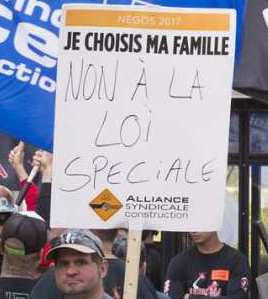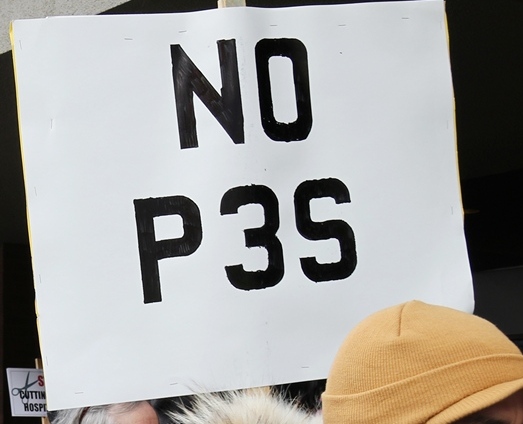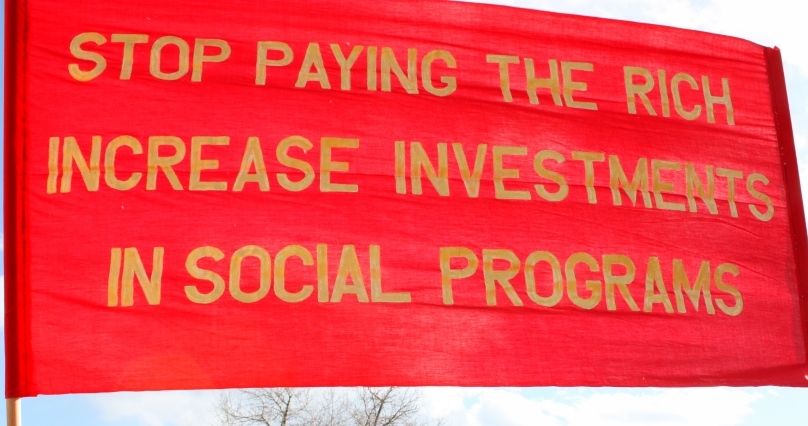|
July 6, 2017
Quebec Trade Union Alliance in
Construction
Challenges Law Outlawing Strike
Construction Workers Defend
Their Rights Against Arbitrariness
and State Repression
PDF

Montreal constructions workers on first day of strike May 24, 2017.
Quebec
Trade
Union
Alliance
in
Construction
Challenges Law Outlawing Strike
• Construction Workers Defend Their Rights
Against Arbitrariness and State Repression
The Fight for Health
Care as a Right
• People Demand Adequate Funding for McGill
University Health Centre
Quebec Trade Union Alliance in
Construction Challenges Law Outlawing Strike
Construction Workers Defend Their Rights Against
Arbitrariness and State Repression

Construction workers demonstrate against passage of back-to-work
legislation
at National Assembly, May 29,
2017.
Five union organizations representing Quebec
construction workers filed a motion on June 29 in the Quebec Superior
Court to defend their right to strike. Organized in the Trade Union
Alliance in Construction, they are challenging the constitutionality of
the back-to-work legislation, adopted in the National Assembly on May
30, which outlawed the construction strike.
Construction workers took strike action to defend
themselves
against the unjust employer demands for concessions. The employers with
backing from the government and its state want to destabilize
workers with work schedules even more arbitrary and difficult than what
already exist.

The special law outlawing the strike
imposes a
bargaining process, which workers and their unions have had no say in
developing. The dictated bargaining process
prohibits workers from taking any action to force employers to
recognize their rights and negotiate in what is generally considered
good faith. The law
prohibits workers from putting any real pressure on employers to
abandon their demand for concessions that attack workers' dignity and
rights.
The Alliance says it will argue in court that the
legislation outlawing workers' active defence of their rights violates
the Canadian Charter of Rights and Freedoms and the
Quebec Charter of Human Rights and Freedoms.
The Alliance states, "[The special law] unjustifiably
undermines workers' right to strike by completely prohibiting them from
exercising that right, which is recognized as a fundamental right by
the Supreme Court.... The freedom of expression of construction workers
is also restricted by this special law."
The Alliance refers to various recent Supreme Court
decisions that
have addressed the issue of collective bargaining and the right to
strike in relation to the freedom of association. The
Alliance says the Charter declares freedom of association to be
a fundamental freedom officially recognized by Canada through the
enactment of the Charter. The Supreme
Court rulings also refer to the "reasonable limits" that the Charter
prescribes in recognizing rights and freedoms. The Alliance is
optimistic that the special law's outright
prohibition of the right of construction workers to strike will be
deemed unconstitutional.
The Alliance's motion also asks the Supreme Court to
declare unconstitutional the prohibition in Bill R-20 [1], the bill that governs labour relations
in construction industry, on bargaining retroactive wage increases back
to the expiry of a contract. In the construction sector, the law
dictates that wage increases workers obtain are applicable only from
the moment the collective agreement comes into force and not from the
time the old collective agreement ends.
Construction workers point out that employers have zero
interest to
negotiate when they know that the state will restrict them from taking
action to defend their rights. Without retroactivity to the expiry of
the contract, employers are paying the old rate until a new contract
comes into effect. This puts added pressure on
workers to accept arbitrary arrangements in working conditions,
especially the scheduling of work. Workers argue that retroactivity
should be automatic and not be used as a weapon.
The Alliance also advocates for the extension of legal
anti-scab
provisions to the construction industry. Presently, the construction
sector is exempt from even the meager anti-scab
provisions in the Quebec Labour Code.
Construction workers denounce the employers and state
for declaring
exceptional conditions in their sector requiring arbitrariness and
attacks on their rights and dignity. Workers
demand the rights of all must be recognized and respected without
exception.
Arbitrariness in the construction sector extends even
to the Occupational Health and Safety Act. Instead of
addressing with compassion and urgency the unacceptable
levels of
death and injury in the sector, construction workers are singled out
for abuse, punitive measures and accused of intimidation for demanding
safe working conditions.[2]
Bill R-20 also accuses construction workers of
intimidation for demanding an end to attacks on their rights and for
taking measures to bring attention to unsafe conditions and for waging
a successful strike struggle. The government is using the police powers
inherent to the state, which serves the ruling class, to protect the
privileges of the employers. It declares that construction sites can
remain open in the event of a strike with scabs allowed to do the work
of those on strike.
With regard to the struggle for safe working
conditions, the government declares the sector exceptional and deprives
construction workers from using provisions in the Occupational
Health and Safety Act that were adopted 40 years ago. When
workers
protest and demand their rights, the government and employers accuse
them of intimidation and threaten them. For a government to declare a
strike or a demand for safe working conditions as "intimidation" and
against a so-called law and to unleash arbitrary police powers against
workers to deprive them of their rights should be considered criminal.
It must not pass!

Construction workers went on strike in the spring to
oppose
arbitrariness in working conditions and denial of their rights. They
were defending their dignity and rights as workers.
Construction workers produce immense value for society through their
work building residential, industrial, commercial and institutional
establishments. The employers want to impose
untenable and arbitrary changes to work schedules, changing schedules
at will in the name of exceptional conditions in the construction
sector. If passed, workers may not even know day to
day or week to week when they work or what hours. How can anyone live
in such a condition? Already construction work is most dangerous.
Arbitrary hours and places of work would
increase the danger. Workers point out that with arbitrariness in
scheduling, the employers even cheat them when counting their hours of
work. With their strike, workers put forward their
demands for wage retroactivity, closure of job sites during strikes,
job security measures including better work scheduling, and safer
working conditions. They presented concrete proposals
how these measures to uphold their rights could be implemented.
The Quebec government declared their strike was
damaging the
economy and passed a special law to outlaw their right to strike. The
state and employers also unleashed hateful
propaganda accusing workers of "criminal intimidation" and declaring
that the exceptional nature of the construction sector required an
outright ban on strikes and prohibition of workers
defending themselves individually or collectively.
Construction workers do not accept these attacks on
their rights.
Their challenge to the special law and other arbitrary clauses and laws
that target them is just and everyone should
support their just cause.
 The state does not want any
improvement in the terms of employment
for construction workers. The Quebec government and employers are
actively engaged in pushing down wages
and working conditions and depriving workers of their rights through
police state measures. The accusations of intimidation and denial of
the right to strike are attempts to weaken the unity
of the workers and their organizations and worsen working conditions. The state does not want any
improvement in the terms of employment
for construction workers. The Quebec government and employers are
actively engaged in pushing down wages
and working conditions and depriving workers of their rights through
police state measures. The accusations of intimidation and denial of
the right to strike are attempts to weaken the unity
of the workers and their organizations and worsen working conditions.
This broad campaign against workers in the construction
sector heralds
its domination and takeover by oligopolies which operate on a global
scale and the availability of vast sums of state money to facilitate
their projects such as the much ballyhooed infrastructure projects and
public-private partnerships. Even the
construction of forest roads is no longer considered "construction"
requiring unionized construction workers engaged in
work according to regulated industry standards. So is more and more
construction in big cities. The government is pushing measures for what
it calls "volunteer" construction work for
example in the school system. These changes are very fishy and
worrisome as the "non-construction" and "volunteer" work on these sites
will fall outside regulations regarding standard
code and rules for health and safety, and adequate training etc.
Construction workers are resisting this state-organized
arbitrariness and attack on their rights. They are taking a stand and
making a contribution in the fight of all workers for their
rights and dignity.
Notes
1. Bill R-20, an Act respecting labour relations,
vocational training and workforce management in the construction
industry.
2. On the issue of health and safety, the government
and employers argue that on-site prevention by the workers to ensure
health and safety is not possible. They say having workers' safety
representatives and health and safety committees on site to ensure safe
working conditions is not feasible because of the particular or
exceptional conditions of the industry. They say too many small
employers, too many unions and too many sites make impossible active
prevention and inspection to enforce codes and regulations.
In opposition to this indifference to their safety,
construction
workers have proposed concrete measures. The issue of many and changing
sites is not an impediment but rather one of
the factors contributing to injury risk. Regarding the reality of many
unions operating in the sector, the existence of the Alliance shows
unions are willing to work together for the common
good. They propose that they would agree among themselves to appoint
joint prevention representatives who would speak on behalf of all the
workers on a site irrespective of which union
they belong to. The government does not agree to this as it has its own
self-serving agenda to hand over the sector those who control the
construction industry to let them manage it in their own private
interests.

The Fight for Health Care as a Right
People Demand Adequate Funding for McGill
University
Health Centre
The Union of Nursing and Cardio-Respiratory
Professionals of the McGill University Health Centre (MUHC) are
demanding a massive injection of funds into new health care facility so
that it functions properly. The Union held a press conference in
Montreal on June 29 to explain why this investment is required. The
centre provides a broad range of clinical programs and is also a
research and teaching facility. The MUHC has recently opened in new
premises as a public-private partnership health care centre,
integrating in a single space a large number of health care
institutions.The Montreal General Hospital and the
Lachine Hospital are part of the MUHC and have been expanded and
renovated but they are not going to move to the new site. The Montreal
Neurological Hospital is also part of the
MUHC and is scheduled to move into the new site at some point. The new
site and building called the Glen opened in the spring of 2015.

The union, part of the Fédération
interprofessionnelle
de la santé du Québec (FIQ), announced at the press
conference that it
was presenting a petition to Quebec Health
Minister Gaétan Barrette signed by over 14,000 people. The
petition demands an immediate stop to the budgetary cutbacks at the
MUHC, asking instead for the investment of adequate funding for this
crucial social program. Union president Denyse
Joseph said that the budgetary cuts at the old
and new MUHC since 2012 amount to over $120 million, with over $60
million in cuts since workers and patients
moved into the new building.
President Joseph gave the following examples of
cutbacks and
irrational decisions that have been made by the hospital authority:
- the elimination of 200 vacant nursing positions in a
context where the workload of nurses is already untenable;
- the increase of health care units without dealing
with the issue
of the workload and without the necessary budgets being allocated;
- a general lack of funding that corresponds to the
level of care offered by the centre; and
- the increase of waiting time in the emergency room
because of a lack of beds for the patients.
"The MUHC should be a model in terms of providing care
to the
patients. This is a university health centre of world renown that is
being left to fend for itself by the government. The
situation must change immediately. We need immediate action and
financing that corresponds to the level of care the health centre is
professing that it is providing," Joseph said.

The union has been active for months advocating for the
patients,
taking part in town hall meetings, and holding press scrums to demand
the health care centre live up to the
expectations that have been created in Quebec, Canada and around the
world about the high level of care it is supposed to provide.
In previous press conferences, the union has detailed
how the
cutbacks are directly damaging patient care and even endangering the
safety of the patients and that of the health care
workers. For example, the layout of the new MUHC is different than what
usually appears in health care centres. Each unit is made up of 12 beds
and each one of them is separated from
the other by a fair distance. With this design, each unit is supposed
to be monitored on a constant and continuous basis by a team of 2 or 3
nurses. With the
cutbacks the ratio of nurses to patients per unit is
diminishing, creating a serious problem for
the care and safety of the patients.
The union also explained that with the new MUHC, whose
restructuring is part of the Quebec government's reckless anti-social
offensive against public health care, the lines of
communication with the hospital authorities have been broken.
Everything the union receives from the MUHC Board is orders and
dictate, while no input from the actual health care providers
is solicited or accepted. One of the reasons for this, the union says,
is
that the CEO works directly on a daily basis with two representatives
of the Health Care Ministry who have been
assigned to the Centre. This leads to what the health care workers call
the omerta, a mafia-style law of silence around the imposition
of budgetary cutbacks. In this situation, the authorities deny any
cutbacks are taking place and a regime of silence is imposed on workers.
In the face of this, the union is demanding an inquiry
into the
management of the health care centre and the actual plans of the MUHC
Board for the future.The union says the MUHC requires an significant
increase in funding to meet the needs of the centre, the health care
needs of the people and the aim and desire of the health care workers
to serve those needs.

PREVIOUS
ISSUES | HOME
Website: www.cpcml.ca
Email: office@cpcml.ca
|

